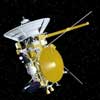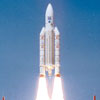|
Sunday:
July 1, 2001 | |
0340 GMT |
 |
Craft launched to unlock secrets of the universe
A NASA space probe designed to map the afterglow of the Big Bang -- the fossil light from the creation of the universe 14 billion years ago -- was launched into space on Saturday atop a Boeing Delta 2 rocket.
 FULL STORY FULL STORY
 MISSION STATUS CENTER MISSION STATUS CENTER
 |  |

|
 |
Space station sends back first radiation data
The first series of radiation data collected inside the International Space Station has been transmitted from space to scientists on Earth eager to assess its potential biomedical impacts and implications for future research.
 FULL STORY FULL STORY
 |  |

|
 |
|
Saturday:
June 30, 2001 | |
0140 GMT |
 |
MAP probe to launch today
A Boeing Delta 2 rocket is ready to launch NASA's Microwave Anisotropy Probe to measure the afterglow from the universe's creation 14 billion years ago, but officials will be keeping a close eye on thunderstorms and pesky boats intruding the restricted waters around Cape Canaveral that could delay the 3:46 p.m. EDT liftoff.
 MISSION STATUS CENTER - updated! MISSION STATUS CENTER - updated!
 MAP OF RESTRICTED WATERS MAP OF RESTRICTED WATERS
 TIMELINE OF LAUNCH EVENTS TIMELINE OF LAUNCH EVENTS
 CHART OF LAUNCH OPPORTUNITIES CHART OF LAUNCH OPPORTUNITIES
 |  |

|
 |
ESA and NASA set new Cassini-Huygens plan
Managers for an international mission to Saturn have announced a revised plan to work around a telecommunications problem and avoid loss of scientific data after the Cassini spacecraft releases the Huygens probe to descend to the surface of Titan, Saturn's biggest moon, in 2005.
 FULL STORY FULL STORY
 |  |

|
 |
Glitch halts free flight test of NASA's X-38
NASA X-38 program engineers decided to postpone the seventh free flight of an X-38 vehicle on Friday. The halt came after the X-38, still secured to a wing pylon on NASA's B-52B mother ship, was already airborne.
 FULL STORY FULL STORY
 |  |

|
 |
DAILY BRIEFING Other stories making news today
|
 |
Expedition Two science operations status report -- An experiment that could make the Space Station an even better place to conduct microgravity experiments was undergoing tests this week in the orbiting laboratory. The Active Rack Isolation System is designed to act like a powered shock absorber to dampen vibrations from powered equipment and crew activities.
|
 |
|
Friday:
June 29, 2001 | |
0600 GMT |
 |
NASA names the launch day for shuttle Atlantis
NASA officials gathered at Kennedy Space Center on Thursday for the traditional Flight Readiness Review and affirmed July 12 as the launch date for Atlantis' 11-day mission. Liftoff is planned for 5:04 a.m. EDT (0904 GMT).
 FULL STORY FULL STORY
 |  |

|
 |
Canada buys Lockheed Martin satellite and launch
Telesat Canada has bought a new direct-to-home TV broadcasting satellite and a rocket to launch the craft from Lockheed Martin. The Nimiq 2 spacecraft is due for liftoff from Cape Canaveral atop an Atlas 5 booster in the fourth quarter of 2002.
 FULL STORY FULL STORY
 |  |

|
 |
ESA solar mission attracts followers to Tenerife
The launch date of Solar Orbiter, ESA's next mission to study the Sun, should be no later than 2010. This was one of the key messages to emerge from the first Solar Orbiter workshop which was held in Tenerife last month.
 FULL STORY FULL STORY
 |  |

|
 |
|
Thursday:
June 28, 2001 | |
0254 GMT |
 |
Hints of planet-sized drifters bewilder scientists
Piercing the heart of a globular star cluster with its needle-sharp vision, NASA's Hubble Space Telescope has uncovered tantalizing clues to what could potentially be a strange and unexpected population of wandering, planet-sized objects.
 FULL STORY FULL STORY
 |  |

|
 |
NASA's MAP probe set for weekend launch
Boeing's Delta 2 rocket is slated for launch Saturday to propel a NASA spacecraft on a journey to detect the afterglow of the Big Bang, which scientists hope will shed light on age-old questions about the content, shape, history and the ultimate fate of the universe.
 MISSION STATUS CENTER MISSION STATUS CENTER
 |  |

|
 |
Space tourism hearing turns into station debate
A Congressional hearing on the nascent space tourism industry Tuesday turned into a debate between Dennis Tito and a NASA official regarding how many people the International Space Station can accommodate.
 FULL STORY FULL STORY
 |  |

|
 |
First Boeing Delta 4 rocket flight engine 'go for launch'
The liquid-fueled main engine that will power the first Boeing Delta 4 rocket off the launch pad next spring has completed acceptance testing, clearing the way for the powerplant's attachment to the vehicle in the factory.
 FULL STORY FULL STORY
 |  |

|
 |
DAILY BRIEFING Other stories making news today
|
 |
Pioneer of U.S. human space flight dies -- John F. Yardley, a leading figure in the early days of human space flight and the Space Shuttle program, died early Tuesday. He was 76.
|
 |
|
Wednesday:
June 27, 2001 | |
0427 GMT |
 |
Satellite images tell tale of Wisconsin tornado
The morning after the northwestern Wisconsin town of Siren was leveled by a devastating tornado, the federal Landsat-7 satellite captured its destructive path from space.
 FULL STORY FULL STORY
 |  |

|
 |
'Grace twins' to investigate the Earth system
The Gravity Recovery and Climate Experiment satellite duo is being prepared for launch to carry out gravimetric measurements of the Earth with an unprecedented accuracy, allowing for detection of minor changes in the gravity field caused by the circulating magma in the planet's interior, melting glaciers or changing ocean currents.
 FULL STORY FULL STORY
 |  |

|
 |
Cluster's whispers probe electrifying plasmasphere
An astronaut who exits a spacecraft without a spacesuit will die very quickly because there is no air to breathe. However, although space is often regarded as an airless vacuum, it is by no means empty. Spacecraft such as Cluster are built to detect and study the sparse 'soup' of electrified plasma that populates near-Earth space.
 FULL STORY FULL STORY
 |  |

|
 |
|
Tuesday:
June 26, 2001 | |
0244 GMT |
 |
Intersputnik reports failure of Express-2 satellite
The Intersputnik International Organization of Space Communications announced Monday that the Express-2 satellite had undergone an emergency de-activation as a result of technical problems with its Earth-orientation system.
 FULL STORY FULL STORY
 |  |

|
 |
ESA awards giant contract for new astronomy satellites
The largest contract ever in the history of European space astronomy has been awarded by ESA to an industrial consortium led by Alcatel Space Industries for the manufacture of two astronomy satellites, the Herschel Space Observatory and Planck.
 FULL STORY FULL STORY
 |  |

|
 |
Boeing Delta 4 to launch DSCS-3 A3 for USAF
Boeing officials have announced that the U.S. Air Force has assigned a second launch of a Defense Satellite Communications System (DSCS) satellite aboard a Boeing Delta 4 rocket.
 FULL STORY FULL STORY
 |  |

|
 |
DAILY BRIEFING Other stories making news today
|
 |
Solar conjunction coming to end for Galileo -- This week the Galileo spacecraft peeks back out from behind the Sun. For about the last three weeks, Jupiter, with Galileo in orbit around it, has been blocked from view by the Sun. During this period of solar conjunction, the radio signal from the spacecraft must pass through the turbulent atmosphere of the Sun.
|
 |
|
Monday:
June 25, 2001 | |
0039 GMT |
 |
Companies use air show to announce launch deals
Arianespace, Boeing and International Launch Services announced a batch of new contracts last week at the Paris Air Show. Here are the three respective corporate releases describing the deals.
 ARIANE SIGNS 8 NEW LAUNCH CONTRACTS ARIANE SIGNS 8 NEW LAUNCH CONTRACTS
 BOEING/MELCO DEAL WORTH UP TO 6 DELTA 4s BOEING/MELCO DEAL WORTH UP TO 6 DELTA 4s
 ILS ATLAS 5 APPROVED BY INMARSAT VENTURES ILS ATLAS 5 APPROVED BY INMARSAT VENTURES
 |  |

|
 |
Adolescent interstellar cloud set for star forming
Astronomers have discovered a highly unusual, massive interstellar cloud that appears poised to begin a burst of star formation. The cloud may be the first ever to be detected in the transition between atomic and molecular states.
 FULL STORY FULL STORY
 |  |

|
 |
X-ray view of a young planetary nebula
Chandra's image of NGC 7027 represents the first detection of X-rays from this young planetary nebula that is about 3,000 light years from Earth. A bubble of 3 million degree Celsius gas with a length about a hundred times that of our solar system is shown in the image.
 FULL STORY FULL STORY
 |  |

|
 |


 The Hubble Space Telescope's majestic view of the Eskimo Nebula. This spectacular poster is available now from the Astronomy Now Store.
The Hubble Space Telescope's majestic view of the Eskimo Nebula. This spectacular poster is available now from the Astronomy Now Store.